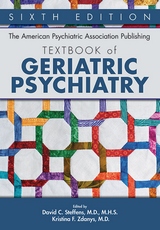Manual of Nursing Home Practice for Psychiatrists
View Pricing
Description
The shifting demographic toward a graying population—coupled with today's reality of managed care—makes the need for high-quality, cost-effective psychiatric services within the nursing care setting more urgent than ever. As we increase the number of our years, it is also imperative that we enhance the quality of those years.
The product of the American Psychiatric Association's (APA's) Council on Aging and its Committee on Long-Term Care and of the Elderly, the Manual of Nursing Home Practice for Psychiatrists stands out because it focuses on the how—not the why—of nursing home care. Of exceptional importance is its detailed discussion of the Minimum Data Set (MDS), a structured assessment required by both Medicare and Medicaid for all residents of skilled nursing facilities.
Divided into six sections, this how to volume contains practical information readers can use right away, from getting reimbursed by insurance companies to handling nursing facility politics:
- Clinical—History; evaluation and management of psychiatric problems in long-term care patients; an overview of the MDS; sexuality within the nursing home care setting
- Regulatory—Introduction to the Nursing Home Reform Act of 1987 (part of OBRA-87) and its implications for psychiatric care; details about the Resident Assessment Instrument (RAI), which includes the MDS, the Resident Assessment Protocols (RAPs), and Utilization Guides specified in the State Operations Manual (SOP)
- Financial—Documentation, reimbursement, and coding; what to look for when contracting with nursing homes
- Legal and ethical—The dehumanizing effect of diagnostic labels and the ethical issues inherent in regulating daily schedules (e.g., bed, meal, and bath times); nursing home placement; competence and decision-making ability; comfort care for end-stage dementia; coping with Alzheimer's disease; and the role of caregivers
- Summary and Future Perspectives—A detailed vision about how psychiatrists can improve the diagnosis and treatment of nursing home patients
- Appendixes and bibliography—Staffing recommendations and assessment instruments
Edited by a distinguished authority and former chair of the APA's Committee on Long-Term Care and Treatment of the Elderly, this comprehensive volume will appeal to a wide audience of professionals: from general psychiatrists, nurse practitioners, and clinical nurse specialists, to primary care physicians and residents.
Contents
- Foreword
- Preface
- Section I: Clinical Considerations
- Chapter 1. Nursing homes, mental illness, and the role of the psychiatrist
- Chapter 2. Evaluation and management of psychiatric problems in long-term care patients
- Chapter 3. Sexuality in the nursing home
- Section II: Regulatory Aspects—OBRA, The Minimum Data Set, and Other Regulations That Chapter 4. Affect Nursing Home Practice
- Chapter 5. The Minimum Data Set (MDS) as a tool for the psychiatrist
- Chapter 6. Introduction to OBRA–87 and its implications for psychiatric care
- Section III: Financial Aspects
- Chapter 7. Documentation, reimbursement, and coding
- Chapter 8. Contracting with nursing homes
- Section IV: Legal and Ethical Issues
- Chapter 9. Legal and ethical issues
- Section V: Perspectives for the Future
- Chapter 10. Perspectives for the future
- Chapter 11. Appendixes
- Chapter 12. Staffing in long-term care
- Chapter 13. Sample preadmission note to a nursing home
- Chapter 14. Sample form for transfer from a nursing home to a hospital or clinic
- Chapter 15. Minimum Data Set (MDS), Version 2.0
- Chapter 16. Other scales
- Suggested reading
- Index
Related Products
Carousel Control - items will scroll by tabbing through them, otherwise arrows can be used to scroll one item at a time








